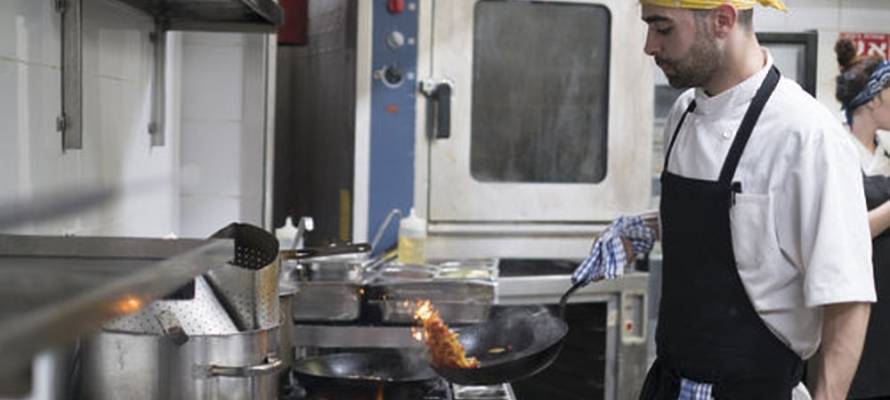An upscale Tel Aviv bistro trains at-risk teens as chefs, thus offering them a fresh start in life.
Jews around the world view the Sukkot holiday as a time for gratitude and acknowledging life’s blessings. Yet for several at-risk Israeli teenagers, there hadn’t been much to be thankful for—until this year, when they’ll take their first steps toward a productive career, and a life off the streets and away from crime, by working at Liliyot.
The upscale Tel Aviv bistro was founded as Israel’s first social business, training young people ages 16-19 as chefs while giving them a new start in life—a mitzvah perfectly suited to this festival.
Liliyot is located across from the downtown Tel Aviv courthouse. Chanoch Barkat, director of the Dualis Group, a nonprofit social-capital organization that runs the restaurant, says many participants have come directly from the court to the eatery—a far better alternative to a harsh prison sentence, especially for those with the discipline to make it in an environment that is often stressful and demanding.
Edward Plastowitz, 19, was a high school dropout in trouble with the law when he found out about Liliyot through his parole officer.
“I talked to the chef,” Plastowitz says. “I told him, ‘Okay, let’s go for it…it’s do or die.’” He knew the system was throwing him a life preserver, and he knew enough to grab hold.
“I was one of these problem kids. I’d run around, get into trouble, and when the parole officer told me about this project, something clicked. I always felt connected to food and cooking,” he says.
Working at Liliyot has brought many difficult lessons. “I left school at 17 after my parents’ divorce, when I had to help my mother make a living,” says Plastowitz. “I worked nights at our family’s convenience store. But during the day, I had nothing to do with myself while all my friends were in school.”
Self-Esteem, Skills and Security
Like many of Liliyot’s 250 graduates to date, each of whom has spent up to 20 demanding months studying cooking techniques and working in the restaurant’s kosher kitchens, Plastowitz has had to learn patience, along with other life skills.
Beyond culinary training, the program helps young people learn basic workday aptitudes they often lack: how to dress for work, for example, and to arrive on time. It also provides participants with hot meals before each shift, while a social worker offers placement services and alumni support for years afterward. There’s also the self-esteem boost and security that come with a paying job.
Program participants make up one-quarter of the restaurant’s staff at any given time, and that kind of support comes at a cost. Half of Liliyot’s profits are channeled directly back into the social side of the business, so Liliyot relies heavily on donations, grants and matching funds from the Israeli government. (The Dualis Group recently received a $2.5 million government matching grant, but must still raise $4 million in donations during the next three years.)
Dualis has used the lessons learned at Liliyot to create social businesses across Israel, offering employment and training, and focusing on the same basic principles: provide excellent products, build social capital and channel profits back into its core social mandate.
Kitchen Manager ‘Like a Second Mother’
“This is the next generation of philanthropy,” says Barkat. “You’re giving them a fishing rod.”
Plastowitz agrees, saying the restaurant has become a second home. “The kitchen manager is like a second mother to me,” he says. “I never worked anywhere where I could call up my boss at midnight to ask for help, or just to talk. That’s what I have here. Something about that draws me to this restaurant, even on days when I wake up not even wanting to get out of bed.”
For a teen who never felt he had a place in the world, that can be a very powerful message.
A Message for Sukkot
As Jews leave the comfort and permanence of their homes to brave uncertain winds and rainy weather to fulfill the mitzvah (Torah commandment) of sitting in the sukkah (temporary hut), it’s worth remembering that not everyone has a comfortable home or a secure, stable life. Thanks to Liliyot and its social business model, Plastowitz and others now have a shot at comfort, security and opportunity—making this truly a season for thanksgiving.
By: Jennifer Tzivia MacLeod/JNS.org










